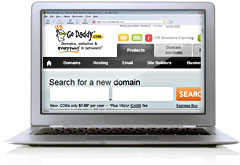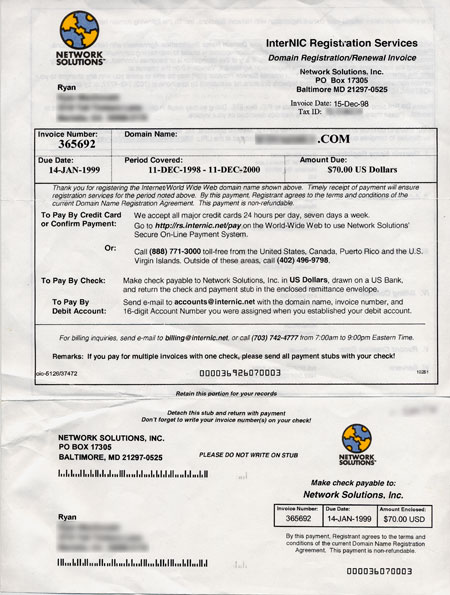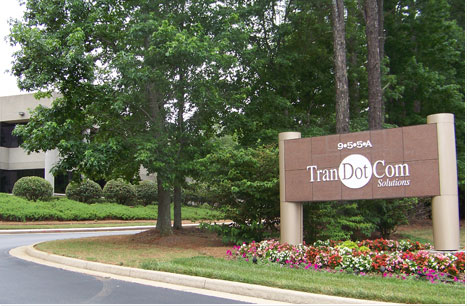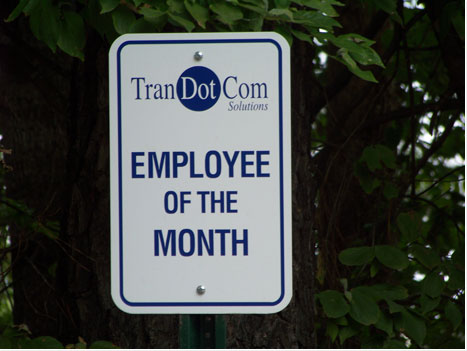 Imagine websites like Mercedes.Benz, Coca.Cola, Bud.Light, White.House, Disney.World. What if, instead of rolling out a handful of new domain extensions (like the proposed .xxx, .nyc, .web, etc.) each year, all possibilities of domain extensions were instantly available.
Imagine websites like Mercedes.Benz, Coca.Cola, Bud.Light, White.House, Disney.World. What if, instead of rolling out a handful of new domain extensions (like the proposed .xxx, .nyc, .web, etc.) each year, all possibilities of domain extensions were instantly available.
In this scenario, instead of picking from existing domain extensions like .com, .net, .org, you could simply choose a name to go before the dot, and a name to go after the dot. You could register Bluth.Company or Moes.Tavern for your business. You could register Kenny.Powers as your personal website or Bedford.Falls for your city. The possibilities are almost endless.
This system could also disrupt current country code values, especially for the less adopted cTLDs. Imagine being able to register .usa instead of sticking to .us. or .britain instead of .co.uk.
One of the reasons that new extensions have been relatively unsuccessful thus far is because it is hard to get the word out to the masses. Each new extension (think .mobi, .tel, .museum, .aero, .jobs or .travel) must face this uphill battle alone and attempt to tell the world that they exist. Years after launch, many people still have never heard of these new extensions that are currently available.
What happens if, instead of attempting to announce every new top level domain extension, the public begins to understand that two words connected by a dot signify a website address.
So how would it work? The new system would be similar to the old system in that you pick the part that goes before/to the left of the dot. Next, instead of choosing from a small list of possibilities for the extension, you would pick whatever you want to go after/to the right of the dot. If the combination was not already taken, you could register it. If the extension to the right of the dot did not exist, it would be created instantly. You could register whatever you want and create any extension you want. Want to register pickle.donkeyknife as your site? Probably not – but you could.

So, would this really be a dot com killer? Maybe eventually, but probably not anytime soon and perhaps not in our lifetime. Even if this new system were possible, global advertising dollars and brands would likely still only promote their .com websites. New TLD extensions have mainly been a footnote in the domain name story thus far and have served to reinforced the importance, trust, authority and value of a .com domain name.
 Last Thursday, I received an email from my (redacted) account rep saying, “I hope this email finds you well. I have a buyer looking to buy a domain name and I’d like to include yours- **********.com- in my pitch to him. Would you be interested in selling this name at $700?”
Last Thursday, I received an email from my (redacted) account rep saying, “I hope this email finds you well. I have a buyer looking to buy a domain name and I’d like to include yours- **********.com- in my pitch to him. Would you be interested in selling this name at $700?” I typically like to wait for an end user to approach me with a good offer, however sometimes it is nice to just sell some domains on your own schedule. I have a couple of big purchases on the horizon, so this week I have been testing a few of the auction sites.
I typically like to wait for an end user to approach me with a good offer, however sometimes it is nice to just sell some domains on your own schedule. I have a couple of big purchases on the horizon, so this week I have been testing a few of the auction sites.  Ten years ago today, I registered my first domain name. At the time, registrations cost $70 for two years. Check out the scan of the invoice below. Also, you did not have to pay right away. You could actually register a name and they would send you a bill in the mail. This resulted in the earliest form of “domain tasting” where someone could “register” a name and then try to sell it before they had to pay the bill. If they sold it, they would pay the bill when it arrived and transfer the name to the buyer. If they did not sell the name, the would simply not pay the bill.
Ten years ago today, I registered my first domain name. At the time, registrations cost $70 for two years. Check out the scan of the invoice below. Also, you did not have to pay right away. You could actually register a name and they would send you a bill in the mail. This resulted in the earliest form of “domain tasting” where someone could “register” a name and then try to sell it before they had to pay the bill. If they sold it, they would pay the bill when it arrived and transfer the name to the buyer. If they did not sell the name, the would simply not pay the bill.
 There was a special surprise at the registration desk given to the first 250 people who arrived at the TRAFFIC conference in New York; a custom Rick “The Domain King” Schwartz bobblehead. The custom bobblehead was produced by
There was a special surprise at the registration desk given to the first 250 people who arrived at the TRAFFIC conference in New York; a custom Rick “The Domain King” Schwartz bobblehead. The custom bobblehead was produced by  Google is arguable the best search engine out there, and yet when using it we sometimes get poor quality search results and “made for adsense” sites. In fact, many of us in the domain and/or SEO industry are responsible for some of those sites. What is a “made for adsense” site? Well, they can be one page landers or they can be large, multi-page websites and they typically have 3 adsense ad areas per page. On the surface, they seem to contain relevant content, but when you actually read the text you discover that it is keyword rich and information poor. For example, here is an excerpt from a site that I would classify as “made for adsense”
Google is arguable the best search engine out there, and yet when using it we sometimes get poor quality search results and “made for adsense” sites. In fact, many of us in the domain and/or SEO industry are responsible for some of those sites. What is a “made for adsense” site? Well, they can be one page landers or they can be large, multi-page websites and they typically have 3 adsense ad areas per page. On the surface, they seem to contain relevant content, but when you actually read the text you discover that it is keyword rich and information poor. For example, here is an excerpt from a site that I would classify as “made for adsense” The auction for Video.us ended at 12pm this afternoon, and this time it sold for $12,000. The name sold for $75,000 last year and then $18,500 earlier this year.
The auction for Video.us ended at 12pm this afternoon, and this time it sold for $12,000. The name sold for $75,000 last year and then $18,500 earlier this year.


